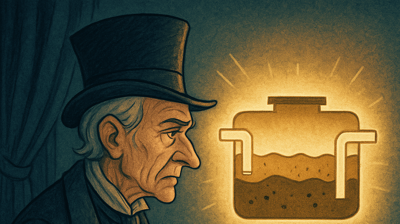Septic tanks have been quietly doing their job for generations, yet misinformation about septic system care continues to spread.
Believing the wrong advice can lead to costly repairs, backups, contamination, and even complete system failure.
To help you make smarter decisions, we’re clearing up the most common septic tank myths – and replacing them with facts you can rely on.
Below are the myths that need to be flushed away for good.
Myth 1: Pouring Grease Down the Drain Is Fine – It Just Settles in the Tank
Grease is one of the worst things you can put down your drain.
When it cools, it solidifies and sticks to pipes, baffles, and internal tank surfaces. Over time, this buildup can cause clogs, reduce system efficiency, and lead to costly backups or repairs.
Fact: Always collect cooking grease in a container and throw it in the trash. Never pour oils or fats down the sink.
Myth 2: “Flushable” Wipes Are Safe for Septic Systems
Products labeled as “flushable” may dissolve eventually – but not fast enough for septic systems. Wipes remain intact, block pipes, snag on internal components, and contribute to backups.
Fact: Only human waste and toilet paper should be flushed. Wipes, paper towels, feminine products, cotton swabs, and similar items belong in the trash, not your septic tank.
Myth 3: Garbage Disposals Can Be Used Freely With Septic Systems
Using a garbage disposal sends food scraps into the septic tank, increasing the solid load and overwhelming natural bacteria.
Fact: Limit garbage disposal use to reduce solids in the tank. Composting food waste extends septic system life and reduces pumping frequency.
Myth 4: Septic Tanks Should Be Pumped Every Year – No Matter What
Some assume annual pumping is mandatory.
But - pumping frequency actually varies based on:
- Household size
- Tank size
- Water usage
- Garbage disposal use
- Amount of solids entering the system
Fact: Most households need pumping every 1-2 years, though inspections determine the best schedule. Regular maintenance prevents overflows, backups, and damage to the drainfield.
Myth 5: Septic Tanks Last Forever
No septic system lasts indefinitely. Most tanks last 20-40 years, depending on the material, soil conditions, and maintenance habits.
Fact: Routine pumping, proper use, and early repairs can extend system life significantly – but eventual replacement is inevitable.
Myth 6: Household Chemicals Don’t Affect Your Septic System
Harsh chemicals such as bleach, drain cleaners, or disinfectants kill the beneficial bacteria that break down waste inside your tank.
Fact: Use septic-safe cleaning products when possible, and use strong chemicals sparingly. Protecting good bacteria protects your system.
Myth 7: Your Septic Tank Doesn’t Need Pumping Until You Smell Odors
Homeowners often wait for signs like odors, slow drains, or backups before pumping. By that point, damage may already be happening.
Once your tank reaches one-third solids, solids begin to escape into the drainfield, leading to clogs or complete system failure.
Fact #1: Pumping is preventative maintenance. If you’re waiting for odors or sewage backups, you’re already too late. Stick to a 1-2 year pumping schedule.
Fact #2: You should be able to check how full your septic tank is. Visit this helpful guide for a step-by-step process to check your septic tank.
Myth 8: Additives Replace the Need for Pumping
Some believe additives can break down solids or eliminate the need for pumping. No additive removes solids from the tank - your tank still needs to be pumped.
Fact: Bacterial additives can support biological activity – especially if you use disinfectants or medications – but they do not replace regular pumping.
Myth 9: Adding Raw Meat Helps the System Break Down Waste
This old myth suggests that tossing raw meat (or, worse, roadkill) into your tank will boost bacterial levels.
Fact: Adding raw meat introduces unwanted bacteria and solids that can clog components. If your system needs beneficial bacteria, use a proper septic additive.
Myth 10: It Doesn’t Matter What You Flush or Wash Down the Drain
Treating your septic system like a public sewer causes major problems. Items that don’t break down will clog pipes, overwhelm the tank, or damage the drainfield.
Avoid flushing or draining:
- Wipes of any kind
- Medications
- Paper towels
- Cigarettes
- Feminine hygiene products
- Grease, oils, or fats
- Chemical, solvents, or paint
- Excessive food waste from garbage disposals
Fact: Only water, human waste, and toilet paper should go into your septic system.
Simple Rule: Take Care of Your System, and It Will Take Care of You
Owning a septic system doesn’t have to be complicated.
The keys to a long-lasting system are:
- Routine pumping
- Responsible water use
- Avoid harmful materials
- Regular inspections
- Supporting healthy bacteria
- Calling experts when something seems off
When you’re unsure, Wind River Environmental is here to help. We can inspect, pump, diagnose, and maintain your septic system to prevent major issues and protect your home.
Contact us today to schedule your service.


.2508280914036.png)


